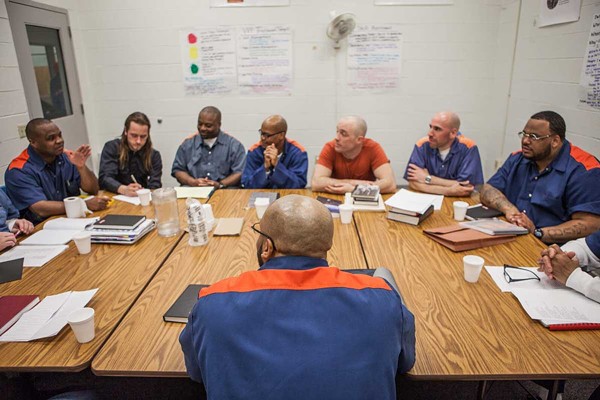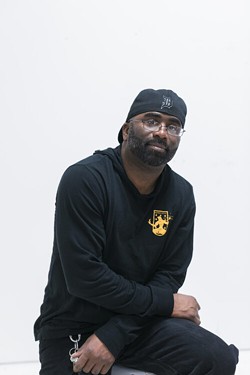When Kyle Daniel-Bey was 17, he received a mandatory life in prison sentence for murder. But even a lifetime behind bars couldn’t imprison his creative spirit. “Juvenile lifer” may be one of Daniel-Bey’s descriptors, but so is writer, poet, artist, activist, and teacher.
While serving his sentence at the Macomb Regional Correctional Facility, Daniel-Bey joined a weekly creative writing and art discussion group called the “Writer’s Block.” Like Daniel-Bey, many of his fellow Writer’s Block artists were juvenile lifers turned adults who never thought they’d be able to share their work outside of prison.
Then 2012 came. That year, the Supreme Court ruled that mandatory life without-parole sentences for juveniles convicted of murder were unconstitutional and considered “cruel and unusual punishment.” The decision was retroactive, leading the way for people like Daniel-Bey to be resentenced and return home, which he did in 2018 after 25 years.
Now in his forties, Daniel-Bey is spearheading an artist residency for returning juvenile lifers like himself, not just to help them settle back into society, but to allow them space to work on their art.
“I’ve always been an artist,” Daniel-Bey says over Zoom. “I didn’t think I’d ever see the day… but when I got out, I didn’t want my art to get lost in all the other things I had to deal with trying to readjust.”
Daniel-Bey is the co-creator of Entry Points along with artist and activist Jonathan Rajewski. The Hamtramck-based residency covers housing costs and utilities for returning juvenile lifers. It also provides them with funds to cover studio materials and opportunities to exhibit visual art or publish their writing if they wish.
Rajewski and Daniel-Bey met in 2012 at the Writer’s Block meetup when Daniel-Bey was in prison and Rajewski was one of the workshop’s volunteers. Writer’s Block was initially organized by the Prison Creative Art Project at the University of Michigan and later became part of the Hamtramck Free School. Rajewski is a co-founder of the school, which offers community workshops, and Daniel-Bey is a co-organizer.
“He had us in there reading Audre Lorde,” Daniel-Bey remembers about the Writer’s Block with Rajewski. “There were a couple different volunteers but his dedication was just different.”
Forging their bond in the Writer’s Block, the pair of activists continued to work together to help people impacted by the criminal justice system after Daniel-Bey’s release. In 2020, they helped organize remote readings of James Baldwin’s The Fire Next Time across eight correctional facilities when the pandemic halted educational programming. In 2021, they published How to Start a Writing Workshop, a manual supporting creative workshops in prison formed without state approval in partnership with incarcerated poets, artists, and activists across the country.
Michigan reportedly had one of the highest juvenile lifer populations in the U.S. and nearly half of them have been released from prison since 2016, according to a report from Michigan Public.
In addition to housing and studio costs, Entry Points also provides a network of activists and educators to help returning citizens make the transition to life on the outside. Daniel-Bey and Rajewski received a Creative Capital grant in 2024 to help fund the program.
Their first Entry Points resident was writer-artist James D. Fusion from October 2022-2023. Fusion also met Daniel-Bey and Rajewski in Writer’s Block at the Macomb Regional Correctional Facility and his work has been featured in The New Yorker, Ugly Duckling Presse, Washington Square Review (New York University Press), University of Michigan Press, and Essay’d (Wayne State University Press). His first poem collection, 20 Years: Reflections of an Empty Sky was released in 2014 and talks about his first 20 years in prison. Fusion is also a 2023 Kresge Arts Fellow.
The next Entry Points resident will be figurative visual artist and writer Yusef Qualls-El, a former juvenile lifer who spent 28 years in prison.
His work often offers commentary on how Black men are disproportionately handed harsh prison sentences. One of his pieces titled “Pre-destined” shows a pregnant Black couple getting an ultrasound and their baby, still safe in their mother’s womb, behind bars on the monitor. He will exhibit work made during and after his incarceration at the end of his residency.
Daniel-Bey and Rajewski’s activism also stretches to the Hamtramck Free School, which Rajewski explains is not a traditional school, but a “rhizomatic educational project.” The school hosts things like poetry readings, film screenings, workshops, and other events rooted in collective liberation and knowledge exchange in and out of the carceral system.
“The Hamtramck Free School is not a school. It has no classrooms [and] no fixed location,” Rajewski says. “We convene in prisons, parks, coffee shops, bookstores, community centers, living rooms, wherever. The Free School is not an organization because ‘organizations are obstacles for organising [sic] ourselves,’ to borrow from The Invisible Committee. It’s more like a continuously changing and emerging set of relationships not bound by the architecture of schools.”
He adds that the school, “recognizes everyone, and acknowledges everyone as capable of being a poet, an artist, a writer, a teacher-student.”
Hamtramck Free School also runs an independent publisher, Free School Press, which published Rajewski and Daniel-Bey’s How to Start a Writing Workshop manual, as well as Qualls-El’s 2017 poetry collection, Thoughts Are Things.
Daniel-Bey’s forthcoming poetry collection, Infernal Speech, Divine Thoughts, is due out from Free School Press in April of 2024. It will be available via Allied Media Projects.
In addition to poetry, since being released from prison Daniel-Bey has earned an associate degree from Wayne County Community College, is an ironworker, and has been a guest lecturer at the Yale School of Art, the University of Michigan, and Wayne State University.
He doesn’t shy away from acknowledging his past.
“Sometimes people say, ‘don’t tell people you were a juvenile lifer,’ but I don’t have a problem telling people that about me,” he says. “I want them to know that I have more to offer. I’m a hard worker. I’m an artist.”
While the first two Entry Points residents are men from the Writer’s Block workshop that Rajewski and Daniel-Bey participated in, they clarify that the program is also open to women juvenile lifers and will have a formal application process.
In 2016 Hamtramck Free School hosted a Writer’s Block poetry performance at the Detroit Institute of Arts. Check out the video below to hear some of the writer’s work.
The Writer’s Block in the Rivera Court from KATIE BARKEL on Vimeo.


